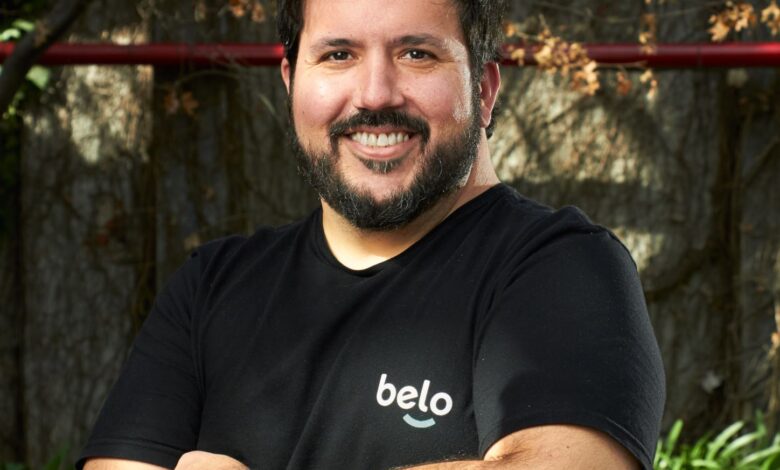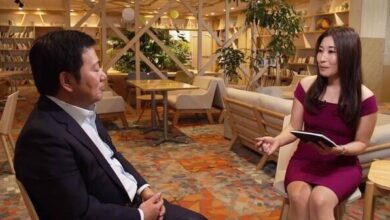How developing a thick skin helped this Argentinian entrepreneur build and expand a booming fintech startup in Latin America

For several years, cryptocurrencies were exclusive to those who understood the market and took an interest in digital coins. Manuel Beaudroit, an entrepreneur with a passion for cryptos, knew the benefits of digital coins and sought to transform them from niche to popular, serving people’s everyday needs.
His mission changed his life’s trajectory, taking him down a path of trailblazing solutions in Latin America — not without the ups and downs that have accompanied the crypto space over the years. As a result, he developed a thick skin and a working philosophy that prioritized patience and hard work over quick results and innovation for the sake of itself.
After bringing pioneering crypto services to the region, Beaudroit’s latest business, belo, is betting on personal finance with digital wallet solutions. The company, which has garnered almost one million users in less than three years of its official launch, aims to become a one-stop shop for remote workers and freelancers in Latin America. Here, they can receive payments in leading fiat currencies from any location and manage their expenses in one place.
Let’s examine this entrepreneur’s trajectory in developing cryptocurrency in the region, tackling the unique obstacles of an underbanked population with technological solutions, adopting a resiliency mindset to propel his success, and where he’s heading next.
Entrepreneurial beginnings and discovering crypto by chance
Beaudroit was born and raised in Argentina, and initially studied biology before attending business school. This career shift blended well with his father’s penchant for technology, which led him to open his first business selling personalized USB sticks. While this project only lasted three years, the entrepreneurial buzz stuck with him, setting the stage for his next endeavors in the coming years.
He eventually joined Accenture in the digital marketing department, where he first discovered cryptocurrencies via Bitcoin. “My first impression was that this was a clear Ponzi scheme, but something made me dive further into the tech and its possibilities — my mind was blown away. After that, I decided to work full-time with cryptos.”
In just three years, he launched two products with his peers: a Peer-to-Peer (P2P) crypto marketplace and one of the first cryptocurrency exchange platforms in Latin America, Bitex.la. Alongside four co-founders, he solidified his expertise in the digital coins industry, expanding the business to Chile, Paraguay, and Uruguay. The company became the first to connect a bank to the Bitcoin network and issue cross-border payments worldwide, reducing the cost of wire transfers by 300%.
Despite increasing success, Beaudroit felt that his product didn’t deliver solutions beyond the boundaries of the cryptocurrency community. “By 2020, I felt that we were failing in our mission to bring crypto to the masses, and I wanted to be part of that solution. So, I decided to start a new adventure, one where I could work more closely with the retail user and let them adopt crypto in their day-to-day.”
Starting a business that caters to real financial issues
Beaudroit was teaching an online course on cryptocurrency, and all was well until it was time to get paid by the platform. This is when he realized there was a huge financial disconnect between Latin Americans and the rest of the world, especially the US. Eventually, he used cryptocurrencies to get paid, but there was the additional headache of using that money to make local payments.
Belo was born from this need to receive payments from anywhere without crippling fees and use cryptocurrencies in daily purchases. While services already existed to solve these demands separately, there wasn’t a unified platform, at least in the region, that worked as a digital wallet that let users make payments and track their expenses and crypto transactions in one place.
The fact that such a solution didn’t exist in a region with a blossoming economy and an expanding digital workforce perplexed Beaudroit. “I was suffering from needing to use an endless list of providers to fulfill my financial needs, and I thought it was crazy that no one was addressing this simple problem.”
So, he decided to take matters into his own hands and solve this financial disconnect, specifically targeting remote workers and freelancers who work for companies abroad — many are calling this e-migration, or working for a foreign company from the comfort of their home country.
Belo started taking shape as a melting pot of financial services, from crypto savings to bill payments and receiving payments in USD and EUR. This proved challenging but well worth the effort: The company has received $4.2 million in funding from over seven venture capital firms and other investors.
“Starting meant orchestrating a list of different providers to be able to accomplish the mission. We began small, and through incremental improvements, we have been able to make a pretty complete solution that basically solves 99% of the problems that you might face when receiving payments from abroad or using crypto daily.”
Tackling the challenges of doing business in a volatile environment
Talking about crypto might elicit skepticism and even pessimism from many, especially after the 2022 crypto winter and a shaky start to 2024. However, Beaudroit isn’t fazed by the rough times. He’s been in the crypto industry since 2012 and has gone through three evolution cycles.
In fact, staying for the long haul has given him a thick skin to tackle the adversities: “First and foremost, I think grasping the notion that everything is cyclical is key to pushing your anxiety down as much as possible. The industry changes, and so do people, and the craze turns into despair, but everything continues to evolve into new technologies and products.”
He compares crypto to the attention AI is currently getting, with people jumping on board and exploiting the technology to make money rather than create real solutions for people. The key is to stay timeless rather than trendy to surf the waves of economic crashes.
Moreover, he states that focusing on one product and developing it to perfection is better than trying to become the next best fleeting product. “One thing that I’ve learned is that value accrues over time, so the more time you can work on something, the more probable it is that you will make something worthwhile out of it. Just keep your head down and bring solutions that people will need for a long time.”
One of the biggest challenges in founding Belo was developing the strength to say no to hot opportunities and knowing what product aspects to prioritize. To face business challenges, Beaudroit said he needed to make some things crystal clear, such as who the user was, why the product was important to them, and determining the size of the problem. “I would argue that if you know the answer to these questions, the rest is simply organizing what goes first and what second.”
Making the next big move to Brazil
While Belo is already present in 20 countries in Latin America for making transactions, it wants to expand its most comprehensive services to the Brazilian market after its successful operations in Argentina. These include bill payments, debit card services with Mastercard, and cash withdrawals with crypto.
Brazil is in the big leagues of global fintech, and holds 40% of the freelancers in the region, bringing about a $210 million market opportunity for a company like Belo. While it sounds like a big bull to tame, the company has already started efforts to open doors in the country by attending the Web Summit Rio earlier this year. “We were impressed by the fact that some people already knew us, which is a perfect starting point for Belo in Brazil.”
Belo has already connected its services with Pix, Brazil’s biggest instant payment platform, so anyone with a Belo account can make payments to or from Brazil — another important stepping stone for Belo’s grand plan.
Beaudroit says of the country’s opportunity to expand, “The market size is ridiculous; you can’t really grasp it until you’re there. But there’s a lot of common ground from which to build a product that satisfies their needs.” However, he’s aware the market is competitive, and users hold their providers to higher standards, so there’s no second chance at a first impression.
By studying the market, understanding user needs, and slowly approaching it with products like integrating with Pix, Beaudroit is slowly solidifying Belo’s next steps in Brazil.
Focusing on real user needs, learning to let go of attractive but ineffective solutions, and developing core products in depth are key practices to growing a successful fintech business in Latin America or anywhere in the world.
Featured photo of Manuel Beaudroit



